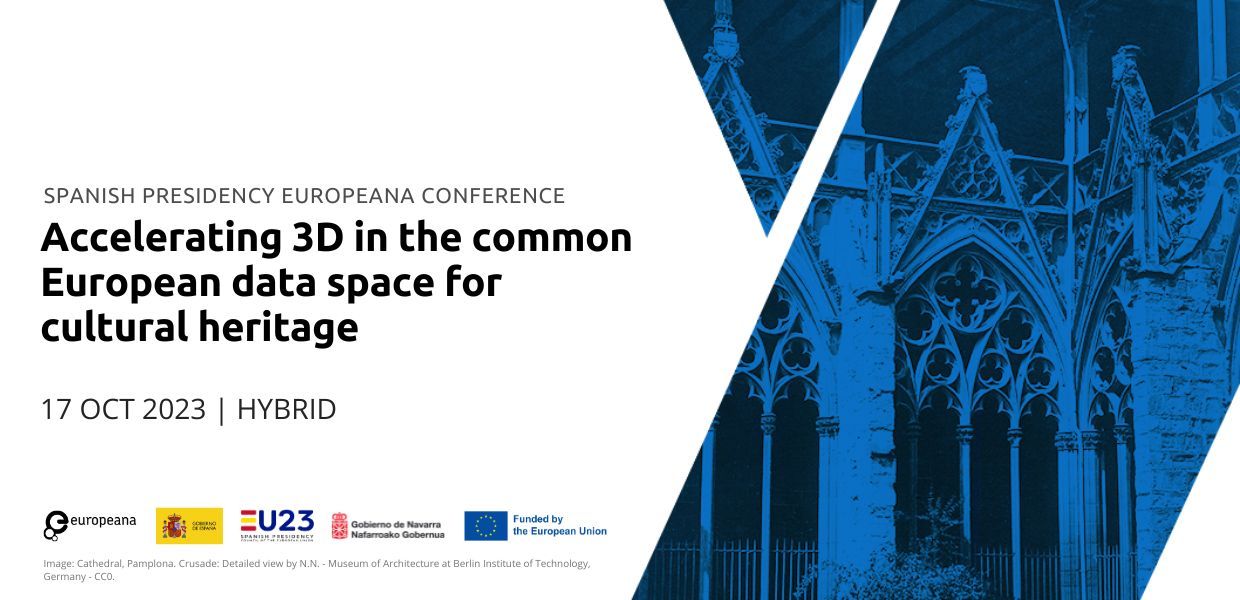In an era defined by digital innovation and preservation of our cultural heritage, 3D technologies offer opportunities to broaden access to culture, preserve Europe’s shared cultural heritage and spur creativity and innovation. The Europeana Initiative is working closely with the European Union’s and its Member States to make the most of these opportunities, and through the upcoming Spanish Presidency Europeana conference, aim to foster a deeper understanding of how 3D digitisation can contribute to the preservation and accessibility of our cultural heritage.
About the conference
The Spanish Presidency Europeana conference on 17 October builds on the discussions held at the Swedish Presidency Europeana conference in April. Set to take place in Palacio de Congresos Y Auditorio De Navarra, BALUARTE in Pamplona and online, ‘Accelerating 3D in the common European data space for cultural heritage: Building capacity for 3D’ explores how to build the capacities of heritage professionals and institutions in selecting, digitising and making available high-quality 3D data.
This hybrid event is hosted by the Spanish Ministry of Culture and Sport and Europeana in association with Spain’s Presidency of the Council of the European Union. The conference aims to contribute to a greater understanding of the needs for capacity building around 3D for the sector and support ‘Twin it! 3D for Europe’s culture’. Twin it! will mobilise all 27 EU Member States to submit one 3D digitised heritage asset to the data space by the end of the campaign in 2024 - find out more.
The event brings together policymakers from European ministries of culture, the Commission Expert Group on the common European data Space for cultural heritage (CEDCHE Expert Group(, Twin it! National Contact Points, representatives of the European Commission, experts in 3D and professionals from cultural heritage institutions.
The programme
The conference will focus on building the capacities of heritage professionals and institutions around 3D workflows, and the rich programme offers many opportunities for learning. Topics in the spotlight include developing the knowledge about skills, processes and resources necessary to create, manage and access 3D digitised cultural heritage content. We will learn about assessing the value of and the need for 3D digitisation; selection processes and working with a 3D technical partner; and copyright and legal Issues surrounding 3D content. We will also look at the European Commission’s Recommendation on a common European data space for cultural heritage of 2021 and its ambitions for 3D; and, Twin it! for Europe’s culture campaign. Explore the full programme.
In addition to the Presidency programme detailed above (open to both online and onsite participants), onsite participants are able to attend two additional workshops on 3D in Pamplona. The first, organised by Giravolt will examine ‘seven steps for a 3D digitisation order’, while the other, organised by Europeana in partnership with Macedonia Studio, will focus on ‘Built with Bits: designing virtual spaces for social impact’. Sign up for the workshops if you are planning to attend the conference in person in Pamplona on 17 October.
Learnings from the Swedish Presidency Europeana conference
The Spanish Presidency Europeana conference will build on the discussions held at the Europeana conference under the Swedish Presidency, ‘Accelerating 3D in the common European data space for cultural heritage: Why 3D matters'. This conference contributed to the reflection and dialogue around 3D content in the common European data space for cultural heritage and the sector – the needs, the key challenges, the aspirations and the collective efforts that are needed. The key learnings from the discussions - also key to bear in mind for discussions at the Spanish Presidency Europeana conference - are:
Shared understanding and clarity among all stakeholders and actors is needed around 3D objectives, standards and rules to direct, optimise and guide 3D digitisation efforts across EU Member States and their institutions.
Motivation of cultural heritage institutions is key. It should be clear to the institutions why 3D matters and is relevant to them, and which value propositions they will benefit from.
Collaboration is vital. The challenges of 3D processes cannot be addressed alone. Dialogue and collaboration between actors have a central role to play. Networks and communities need to be strengthened and nurtured to support institutions, and share expertise and best practices in 3D selection, digitisation, access, storage and preservation.
Standards, frameworks and guidelines for 3D digitisation, access, storage and preservation and ensuring the longevity of 3D content are widely recognised to be crucial.
Defining what constitutes heritage at risk, categorising and prioritising them for 3D digitisation is an important step.
Technology and infrastructure to support the functions of ingesting, storing, managing, preserving and providing access to 3D content, provided by European actors, are needed.
Training for and building the capacity of cultural heritage professionals and institutions around 3D workflows are all important to mitigate 3D skills gaps and talent shortage.
Guidance on copyright and legal matters surrounding 3D Data is needed.
Explore the full report and read the findings and outcomes of the discussions. (LINK)
Register for the for the Spanish Presidency Europeana conference
Registration for the conference is now open, so ensure that you sign up to be a part of the discussions! You can also learn more about 3D and Twin It! 3D for Europe’s culture.



